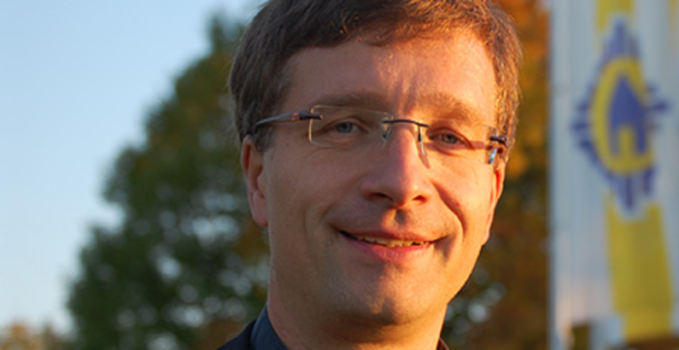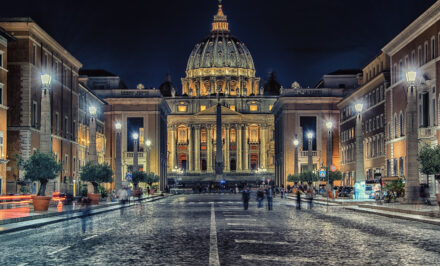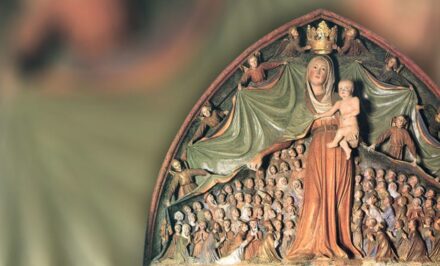Sermon at the Pontifical High Mass on 18.08.2019 in Schoenstatt, Bishop Dr Michael Gerber, Fulda •
“We live in serious times, and the people are often unable to remain strong through this process of purification that is taking place now. They fall into complaining against God and the good, they lose their faith in the good and in mankind.”[1] —
Dear Sisters and Brothers,
This quotation seems to come from a current commentary on events in our times. “We live in serious times …” We think of the current global tensions, of the expiry of the Arms Reduction Treaty between the USA and Russia, of the conflict in the Straits of Hormuz, of the worldwide flow of refugees, of the smouldering civil wars in the Middle East, in Africa or Venezuela. At the same time we are reminded of our Church’s loss of credibility and its causes. We are reminded of the tensions within the Church between the various actors that result from it.
“We live in serious times …” Yet the passage I have just quoted is just a hundred years old. It is taken from a letter written by Alois Zeppenfel in April 1920. The letter was written under the impression of the conference at Hoerde that had taken place a few months before, which he taken the lead in organising. Let us read what else Zeppenfeld wrote: “Our Federation does not give in pessimism! It opposes the radical nature of the Evil One with the radical nature of the good, and believes that the good will win through, indeed that it has to win through. Only sound optimism helps to renew people and the world; pessimism never builds up, it often only pulls down!”
At this point in time the writer of these words had had a number of war years and traumatic experiences behind him. Alois Zeppenfeld and his contemporaries must have experience the months directly after the war as really chaotic: The collapse of the monarchy in Germany and the arduous path to a new and democratic constitution; a precarious supply situation and a lasting weakening of their nation through the loss of large areas and the reparation payments that had to be made. The situation was anything but innocuous. When we look back, we know that it contained the causes for the strengthening of National Socialism.
Dear Sisters and Brothers,
Let us keep in mind the mood of society at that time as we read about the optimistic outlook of those first Federation members. If, through faithfulness to our origin, we want to live our mission in the context of the questions of our times, doesn’t it mean first of all that we have to latch onto the fundamental mood of those first Federation members in a new and deeper way?
“Our Federation does not give in pessimism! It opposes the radical nature of the Evil One with the radical nature of the good, and believes that the good will win through, indeed that it has to win through. Only sound optimism helps to renew people and the world; pessimism never builds up, it often only pulls down!”
That is not simply a quotation from a youthful idealist. It was written by a young student who, together with our Father and Founder and other members, would build up a completely new type of Church Movement for that time. It would be a Movement that would prove to be, on the one hand, fruitful for the Church and society, and on the other, resistant to adverse circumstances such as National Socialism.
What is characteristic for this beginning a hundred years ago? Without claiming to be complete, I would like to pick out a few elements. They are elements I believe could offer us a perspective today in view of very urgent current questions.
A first element: Our Father and his members were convinced that behind what had happened on 18 October 1914 and the years that followed there was a divine initiative. This has decisively marked the mentality of our Schoenstatt Family since then. We are convinced that God acts in history and the present moment. Without this conviction Hoerde would not have been possible, and without this conviction, the impact of Hoerde’s history, the start of the Apostolic Federation and the Apostolic Movement, would not have been possible.
Nevertheless, in view of the present significant trends also in the Church, we may in no way take this conviction of a “divine initiative” for granted. In many ecclesial circles we find something like an “ecclesial deism”. By this I mean a way of thinking that, although it assumes that in Jesus Christ God brought an essential impulse into this world, we can no longer speak of God acting today. Too much is going wrong in the world for us to be able to believe that God is both a loving and acting God. Instead we are challenged to draw our conclusions from that impulse of Jesus at that time for our actions today.
However, uncritical talk of God’s actions today, of a divine initiative today, are questioned from a completely different side. We experience this, for example, in the context of the preparations for the Amazon Synod. Notable experts question the Instrumentum Laboris in preparation for this synod. These critics ask whether, in contrast to the salvific event in Jesus Christ testified to in the Scriptures and tradition, the theological evaluation of indigenous traditions are not defining new sources of revelation? Is this happening in a way that contradicts the Church’s understanding of revelation?[2] We have to take these questions seriously. How can we envisage the possibility of God working today in relation to the salvation event of the Incarnation, death and resurrection of Jesus Christ? We notice that we cannot talk uncritically about a “divine initiative”. Neither in the Amazon, nor in Schoenstatt, can we be dealing with a sort of “parallel or particular revelation”. If we talk about a “divine initiative”, it cannot simply be thought of as “next to” what the Scriptures and tradition testify.
Dear Sisters and Brothers,
We are not dealing here with something trivial, or theological hair splitting. If our conviction of a “divine initiative” had marked our mentality in the Movement for more than a hundred years, Schoenstatt must – at least in the Federations and Institutes – be able to enter into dialogue with the spiritual currents of our days, and hence also be able to justify our thinking theologically.
Two hints from our founder come to mind. On the one hand they are completely in line with Church teaching, and at the same time also give expression to our founder’s original way of thinking:
First hint: When God takes the initiative here and now, nothing “else” or “additional” takes place to what the Scriptures and tradition testify. On the contrary, what has happened in Jesus Christ, and what the Bible testifies, becomes present in a new way.[3] Our founder points this out repeatedly. He has expressed this strikingly in the Office Hours in Heavenwards.
We also see here the offer of an interpretation for the dramatic situation of the Church in our days. Can what we experience also be explained as the making present of what the disciples and Mary, as well as the other women, experienced in the days before and after Easter? We see betrayal and blatant abuse of their own mission by significant representatives of the Church who had actually been entrusted with the care for souls. As a consequence we experience people drifting apart and a rapid loss of meaning. There is a growing feeling among many in that community that traces itself back to Jesus Christ, who find it impossible to recognise the “sign of salvation”. From the vital community of Palm Sunday there seem to be very few left a few days later. Was that only the case then, or is it also true today?
I believe that today our Father would lead us to interpret the current situation of our Church as making the drama of Easter present today. This can also help us to get away from a fatalistic and pessimistic attitude, and find our way to that fundamental mood that characterised our Federation members a hundred years ago. We don’t know how much drama will mark the path the Church of our days will follow in the time to come. However, precisely here we may experience in a deeper way the communion of the disciples and Mary in those hours of Easter. This is also the meaning of the covenant of love – a covenant that continues beyond time.
A second hint: According to the teaching of the Church, we understand revelation as a dialogue between God’s revelation of himself and its acceptance by humankind. However, it is the Holy Spirit who personally opens the heart and mind of people for this acceptance.[4] Throughout his life one of the essential questions of our founder was: How are the heart and the depths of the soul opened for God to work there? He went on to ask: How can I become attentive to where the Holy Spirit opens a person’s soul? This gives our view of the expressions of the human soul, and the manifestations of the human soul in a culture, theo-logical meaning in the truest sense. We ask: How could such a movement possibly reveal the work of the Holy Spirit, who opens souls for the message of the Gospel?
Dear Sisters and Brothers,
Along with Hoerde, our Movement understands itself as an “Apostolic Movement”. What does apostolate mean today in a post-modern and pluralist society? In the sense of St Paul this could mean standing up for the Word of God and the truth of Jesus Christ in season or out of season.[5] However, this was only half of the apostolic approach of St Paul and our founder. On the other hand, St Paul and our founder teach us to be attentive to where the Holy Spirit opens doors.[6] For our Father this was above all a question of where the Holy Spirit opens a door, as it were, in a person’s soul. Consequently, must we not critically question our own reactions and defence mechanisms with regard to many phenomena and expressions of life in our present-day society?
Dear Sisters and Brothers, “Apostolic Movement” means that here and now, in this post-modern, multi-optional world, we have to win people for a living relationship to Jesus Christ and for the Gospel. This cannot only meant simply looking for people who still show some sort of “good Catholic” attitude. If we believe in the continued divine initiative, we have to reckon with it that the Holy Spirit will open the souls of very different people for his message, precisely also in the souls of those where we least expect to find it on account of their lifestyle.
What does that mean for an apostolic attitude? We ask: Where is, here and now, a starting point in a person’s soul from which something can begin to move? Where and how do we, as apostolically minded people, deal with it?
During his time in Milwaukee Fr Kentenich expressed this very clearly:
“If I am a gardener or educator (we could also say: If I am working apostolically; MG), I have to give the plant what it needs. If I am a charlatan I throw down some sort of fertiliser for the plant. (…) We could say that because we don’t have a Catholic mentality today, all our shots go nowhere. (…) Our starting question was: Where are the most elemental and basic drives of the soul? If we don’t take up take up the most basic forces, we only stick things on. The original drives are alive, but they are not developed.”[7]
Put another way we could say: If a person today, who has grown up in a pluralist world, does not discover the relevance of the Good News, and the way the Church could have for the deep questions of their soul, the way and truth offered by Christianity remain very strange to them.
The five years separating 18 October 1914 and Hoerde were essentially characterised by the deep longing of the Sodalists that found an echo in what they had experienced in their common striving as Schoenstatters. That is why Schoenstatt grew before and after Hoerde. This is clearly expressed, for example, in a talk the young Albert Eise gave during a reunion and commemoration on 21 April 1919, hence during the preliminary stages before Hoerde.[8]
According to Kentenich, commitment to the apostolate today means, on the one hand, standing in the truth of what the Bible and tradition have revealed, and on the other, profound understanding for the movements of the hearts of the people we encounter – in the supermarket, before the entrance to the Kindergarten, in the queue at the baker’s, at work, in the Intercity train, in a neighbour’s house, but also in a number of trenchant social comments, including those on Church politics. Let us ask ourselves the critical question: How did I react in Germany to the initiative “Maria 2.0”? Or, how did I react in Chile to the “Letter of the Chilean Youth to the Schoenstatt Movement in Chile”? Was it immediately met with a defensive reaction? When do I ask more deeply: Which voices of souls stir in such an initiative? Which experiences could possibly underlie them? What does God’s Spirit have to say to me through them? This by no means implies that I have to agree with the positions expressed there. However, the question: Which movements of the heart underlies them, will open an initial access and the opportunity to enter into a constructive dialogue. I am grateful that I have been able to have some conversations with representatives of “Maria 2.0” in this spirit in the diocese of Fulda.”
A final thought for today: What does this mean also structurally for the way of the Church as a whole? Pointedly: What would the leadership of the Church today have to look like so that this tension between preserving the faith handed down to us, on the one hand, and being open for the moments of the hearts of the people, on the other, and the connection between the two, can succeed?
I think that our Federations and Institutes, in the way their government is structured, can contribute a significantly prophetic, and at the same time critical, element to our present discussion within the Church. At the moment we are fighting a great deal in the Church about the question of what leadership could look like, especially also about who can embrace leadership and to what extent, and who not. We are fighting about the conditions and criteria for entrance to the priesthood.
In my opinion it cannot only concern the question often raised today about by whom and where and how leadership may be exercised, instead it has to deal essentially with the fundamental question of what leadership looks like. Schoenstatt’s Federations and Institutes give a completely individual answer: There is – as in all communities acknowledged by the Church – a superior. According to the Constitutions these are clearly tied in many instances to a Council. In a special way the superior stands for the unity and identity of the community – a typical task of leadership, therefore. In principle they guarantee the unity of the community with the truth and the mission of the Church, and their specific identity with the mission of their own community.
In addition there is a priest who is Spiritual Assistant or Spiritual Director. Except for the Schoenstatt Fathers and the Institute of Diocesan Priests, this is an extra person, hence a complementation to the superiors, or superior. This priest stands for – not exclusively, but as a special responsibility – the sacramental reality of the Church in the community concerned. This principally consists in administering the sacraments, especially the Eucharist and Reconciliation, as well as proclaiming the word. In their lives, each community is meant to understand itself as an original making present of the Christ event. Also this is a specific and indispensible service to the community: Leading it to the foundation, which no community can give itself, which is Jesus Christ himself.
Besides this – and this developed many years ago as something in Schoenstatt that was new in the Church – the Federations and Institutes have members who are responsible for the spiritual life of the community and for the spiritual currents within it. In the Institutes this is the office of the General Course Leader or General Course Mother. In the Federations there are individual members, or in the Family Federation a couple in the general government, who are responsible for the leaders of the courses. They are attentive to the spiritual life and currents in the courses. They advocate creating room within the structures of the community for these spiritual currents, for example, in finding the motto for the year.
Identity, sacramental reality, sensitivity to spiritual life – these are the three dimensions of leadership. In the Federations and Institutes they are embodied in the togetherness of different people in their governments. The superiors and General Course Leaders are tied to their respective Councils, or the circle of Course Leaders or Course Mothers. Could a key to the many questions of leadership in our Church be found in this multi-dimensional understanding of leadership? Are the current discussions on office and criteria for admission also indicate the need to continue the thinking on leadership in the sense of Schoenstatt’s experience? Does also our Church need a mutually complemental form of government, such as we have in our communities? For me as a bishop these are open questions at the moment that we should be tackling together.
You may object: These models of government are only fruitful in the Schoenstatt Federations and Institutes, because there is common striving, and what we call the “cultivation of the spirit”. We can’t presuppose this in other areas of the Church.
On the contrary, dear Sisters and Brothers in the Federations and Institutes, what does it mean? Seeing to it that the cultivation of the spirit in the many and varied areas of the Church succeeds. That is what the Sodalists at Hoerde started at that time. What is said in their Memorandum? “What matters is not in the first place to start a new association, a new organisation; rather, in prudent adaptation to the existing network of organisations, we want to breathe an apostolic soul into the existing communities, and support them.”[9] We may not be put off because we clearly feel the limitation of our forces today. Like our Father and Founder let us believe in the “creative resultants”, in God’s initiative. Let us embark on what God wants to do together with us.[10]
[1] Letter from Alois Zeppenfeld in April 1920, quoted in the MTA of 15.4.1920.
[2] Cf. the criticism of Gerhard Ludwig Müller in Die Tagespost of 18 July 2019, p. 9f. The heading to the article “God is simply not everywhere” over-emphasizes Müller’s statement: “God is simply not present in the same form everywhere and in all religions, according to which the Incarnation would be only a typical Mediterranean phenomenon.”
[3] Cf., for example, J. Kentenich, Address to Priests’ Institute on 22 April 1968: “At that time we coined the phrase: new divine initiative. In Biblical terms we could also say for this: ‘Today salvation has come to this house’ (Lk 19,5), salvation has again come!’ Whoever has entered to some extent into the thinking of John XXIII, and prayed they way into the intentions of Divine Providence with the Second Vatican Council, will know how strongly the Church is longing for a repetition of the situation in the Cenacle, a repetition of the descent of the Holy Spirit.”
[4] Cf. Second Vatican Council: Dogmatic Constitution Dei Verbum on Divine Revelation, §5: “The obedience of faith” (Rom. 16:26; see 1:5; 2 Cor 10:5-6) “is to be given to God who reveals, an obedience by which man commits his whole self freely to God, offering the full submission of intellect and will to God who reveals,” (4) and freely assenting to the truth revealed by Him. To make this act of faith, the grace of God and the interior help of the Holy Spirit must precede and assist, moving the heart and turning it to God, opening the eyes of the mind and giving “joy and ease to everyone in assenting to the truth and believing it.” (5) To bring about an ever deeper understanding of revelation the same Holy Spirit constantly brings faith to completion by His gifts.
[5] Cf. 2 Tim 4,2.
[6] Cf. Acts 14, 27, et aliis.
[7] J. Kentenich, Schoepferische Resultante, Father texts in Milwaukee, p. 279f.
[8] Cf. MTA magazine of 15.05.1919, p. 41.
[9] Friedrich Ernst: Die Bedeutung der Hörde Tagung 1919 für die Apostolische Bewegung von Schönstatt, Paderborn 1959, p. 37.
[10] Cf. Acts 14,27.
100 Years Hoerde – Bishop Dr. Michael Gerber, Sermon 18.08.2019 – revised version english PDF
Translation: Mary Cole, Manchester, UK
How do I become aware of where the Holy Spirit opens a person’s soul?














